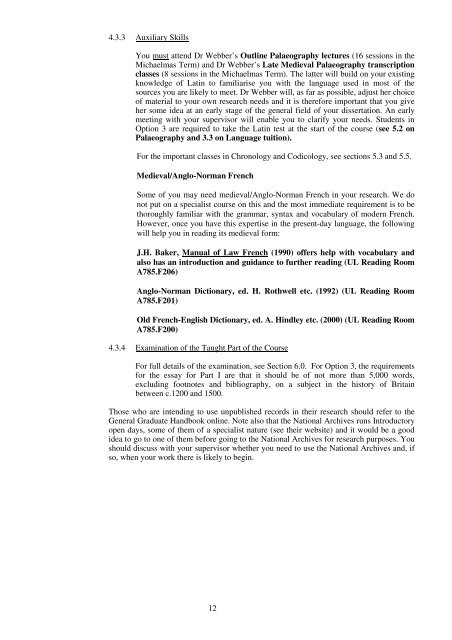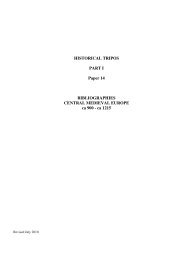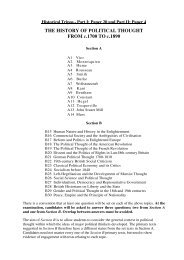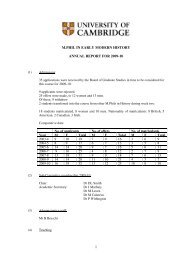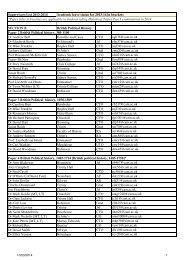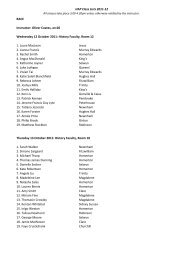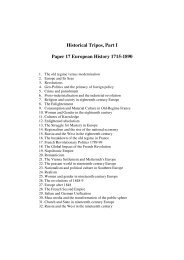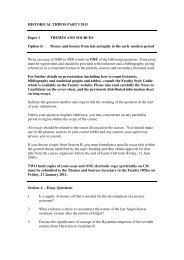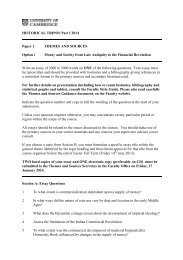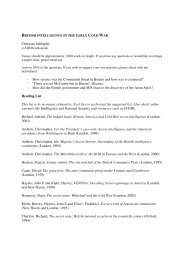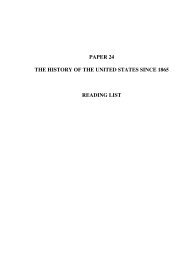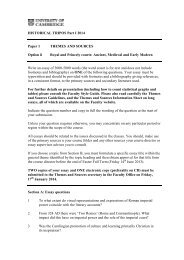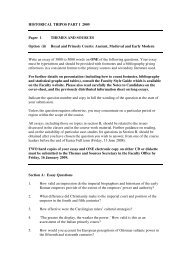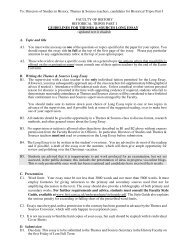Course Handbook - Faculty of History
Course Handbook - Faculty of History
Course Handbook - Faculty of History
You also want an ePaper? Increase the reach of your titles
YUMPU automatically turns print PDFs into web optimized ePapers that Google loves.
4.3.3 Auxiliary Skills<br />
You must attend Dr Webber’s Outline Palaeography lectures (16 sessions in the<br />
Michaelmas Term) and Dr Webber’s Late Medieval Palaeography transcription<br />
classes (8 sessions in the Michaelmas Term). The latter will build on your existing<br />
knowledge <strong>of</strong> Latin to familiarise you with the language used in most <strong>of</strong> the<br />
sources you are likely to meet. Dr Webber will, as far as possible, adjust her choice<br />
<strong>of</strong> material to your own research needs and it is therefore important that you give<br />
her some idea at an early stage <strong>of</strong> the general field <strong>of</strong> your dissertation. An early<br />
meeting with your supervisor will enable you to clarify your needs. Students in<br />
Option 3 are required to take the Latin test at the start <strong>of</strong> the course (see 5.2 on<br />
Palaeography and 3.3 on Language tuition).<br />
For the important classes in Chronology and Codicology, see sections 5.3 and 5.5.<br />
Medieval/Anglo-Norman French<br />
Some <strong>of</strong> you may need medieval/Anglo-Norman French in your research. We do<br />
not put on a specialist course on this and the most immediate requirement is to be<br />
thoroughly familiar with the grammar, syntax and vocabulary <strong>of</strong> modern French.<br />
However, once you have this expertise in the present-day language, the following<br />
will help you in reading its medieval form:<br />
J.H. Baker, Manual <strong>of</strong> Law French (1990) <strong>of</strong>fers help with vocabulary and<br />
also has an introduction and guidance to further reading (UL Reading Room<br />
A785.F206)<br />
Anglo-Norman Dictionary, ed. H. Rothwell etc. (1992) (UL Reading Room<br />
A785.F201)<br />
Old French-English Dictionary, ed. A. Hindley etc. (2000) (UL Reading Room<br />
A785.F200)<br />
4.3.4 Examination <strong>of</strong> the Taught Part <strong>of</strong> the <strong>Course</strong><br />
For full details <strong>of</strong> the examination, see Section 6.0. For Option 3, the requirements<br />
for the essay for Part I are that it should be <strong>of</strong> not more than 5,000 words,<br />
excluding footnotes and bibliography, on a subject in the history <strong>of</strong> Britain<br />
between c.1200 and 1500.<br />
Those who are intending to use unpublished records in their research should refer to the<br />
General Graduate <strong>Handbook</strong> online. Note also that the National Archives runs Introductory<br />
open days, some <strong>of</strong> them <strong>of</strong> a specialist nature (see their website) and it would be a good<br />
idea to go to one <strong>of</strong> them before going to the National Archives for research purposes. You<br />
should discuss with your supervisor whether you need to use the National Archives and, if<br />
so, when your work there is likely to begin.<br />
12


